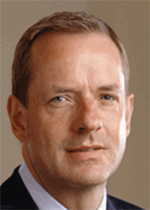In the wake of successful spinoffs by Abbott Laboratories ($ABT) and Pfizer ($PFE) this year, investment bankers figured other like-minded companies would follow suit. And now, as it prepares for a crop of new treatments to hit the market, GlaxoSmithKline ($GSK) is joining the ranks of Big Pharma companies that no longer want to be quite so big.
 |
| Glaxo CEO Andrew Witty |
In a Reuters interview, Glaxo CEO Andrew Witty said the company would slow down on acquisitions, preferring to sell off operations instead. This year's target: assets worth around $1.5 billion in revenue. "I think our proceeds from divestments will far exceed our acquisition costs," Witty told Reuters. "Our energy around acquisitions and our machine around acquisition is the lowest it has ever been in the history of the company."
That doesn't mean GSK will be stepping away from the bidding table completely. There's still room to bolster growth areas like emerging markets or rare technology, as the company did with last month's acquisition of vaccinemaker Okairos. But Witty said GSK's size would be dictated by the success of its pipeline--one that includes three medicines that have already been approved this year and another three that could reach that point by the end of 2013, Reuters notes. Three of those 6 are expected to bring in a combined $3 billion. And 14 more should report late-stage clinical trial results by the end of 2014.
For Pfizer, divestment has so far proved a strategy worthy of imitation. Over the last couple of years, CEO Ian Read has been trying to focus on the company's core prescription drugs business, and his streamlining efforts have resulted in the sale of Pfizer's Capsugel unit, a sale of its nutrition business to Nestlé and the spinoff of its animal health unit, now called Zoetis, which raised more than $2.2 billion in its IPO.
For Glaxo's part, it has already sold off a set of OTC products and two drink brands since last year, and it plans to sell off two anti-blood-clotting drugs to a South African company. Witty in the past has said he's open to the idea of a spinoff, and the April announcement that the company would place some older drug brands in a new division by next January caused many to wonder whether the company was preparing for just that.
Of course, the success of the company's divestment strategy will depend on the ultimate success of its pipeline. But in the meantime, Witty says, slipping a bit on the Big Pharma revenue list should be of no concern. "If we drop two or three or five points down the league table, who cares?" Witty said. "If that pipeline arrives and can drive leverage off this base, that is a prize worth having."
- read the Reuters story
Special Report: Sir Andrew Witty - The 25 most influential people in biopharma today - 2012